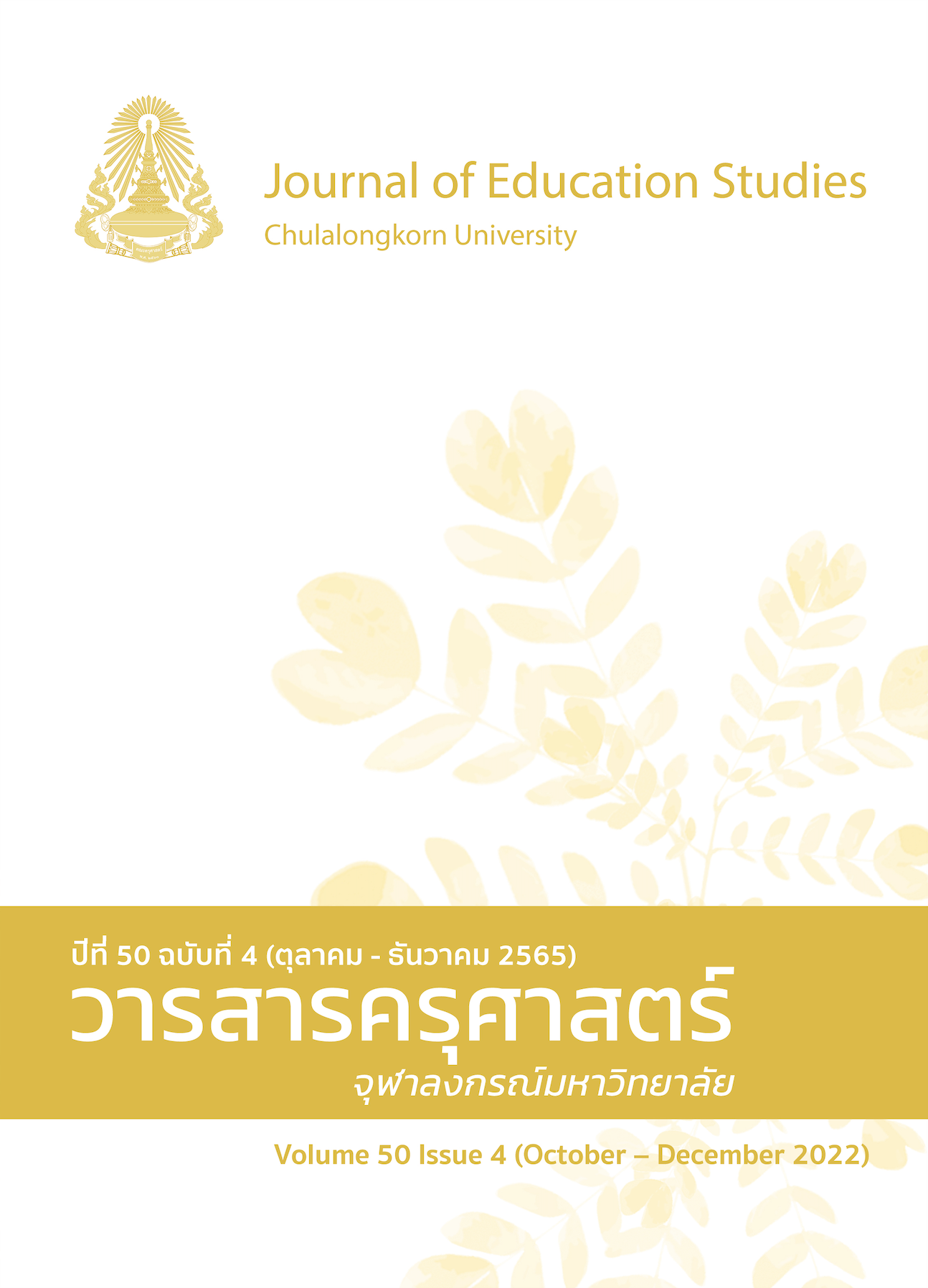Teaching Techniques for Designing Physics Learning Activities during the COVID-19 Pandemic: Analysis of Pre-service Teachers’ Lesson Plans
DOI:
https://doi.org/10.14456/educu.2022.34Keywords:
physics teaching technique, physics concepts, science process skills, five key competencies, pre-service teacherAbstract
This research had two aims: first, to analyze research articles on physics instruction during the COVID-19 crisis and determine teaching techniques that enhanced upper secondary students’ physics concept understanding, science process skills and five key competencies; second, to analyze the teaching techniques selected by pre-service physics teachers and how they applied them in lesson plans in an online context. A content analysis and an inductive coding were conducted on 79 selected research articles and 85 lesson plans in this study. The results showed that smartphone application, simulation and online clip video were the most frequently used to develop students during the COVID-19 pandemic. In addition, the findings showed that pre-service physics teachers integrated techniques of using digital instructional materials in their physics lesson plans based on various methods, such as explaining concepts, practicing science process skills and learning life skills through online group activities. Besides, the findings showed that the most frequently used teaching techniques were online video clips aimed at building students’ understanding of physics concepts, simulations for developing students’ science process skills, and online video clips with a set of questions for promoting students’ five key competencies.
References
Ana, A., Amir M., Asep B. D. N., Asnul, D. M., Rina, M., & Tryastuti, I. B. M. (2020). COVID-19: From health, education, economic, to science and technology in Southeast Asia and India. Nova Science.
Adri, H. T., Yudianto, S. A., Mawardini, A., & Sesrita, A. (2020). Using sign animated video based on scientific approach to improve students’ higher order thinking skill. Indonesian Journal of Social Research, 2(1), 9-17. https://doi.org/10.30997/ijsr.v2i1.23
Bowen, G. A. (2009). Document analysis as a qualitative research method. Qualitative Research Journal, 9(2), 27-40. https://doi.org/10.3316/QRJ0902027
Campari, E. G., Barbetta, M., Braibant, S., Cuzzuol, N., Gesuato, A., Maggiore, L., Marulli, F., Venturoli, G., & Vignali, C., (2021). Physics laboratory at home during the COVID-19 pandemic. The Physics Teacher, 59(1), 68-71. https://doi.org/10.1119/5.0 020515
Celik, B. (2022). The effects of computer simulations on students' science process skills? Literature review. Canadian Journal of Educational and Social Studies, 2, 16-28. https://doi.org/10.53103/cjess.v2i1.17
Hamed, G., & Aljanazrah, A. (2020). The effectiveness of using virtual experiments on students’ learning in the general physics lab. Journal of Information Technology Education: Research, 19, 976-995. https://doi.org/10.28945/4668
Henukh, A., & Guntara, Y. (2020). Analyzing the response of learners to use kahoot as gamification of learning physics. Gravity. Jurnal Ilmiah Penelitian dan Pembelajaran Fisika, 6(1), 72-26. https://doi.org/
30870/gravity.v6i1.7108
Hikmawati, H., Ayub, S., & Sahidu, H. (2021). The effect of the discussion method of video analysis of physics learning on high level thinking skills of students. Jurnal Ilmiah Profesi Pendidikan, 6, 74-80. https://doi.org/10.29303/jipp.v6i1.155
Karlsson, G., Ivarsson, J., & Lindström, B. (2013). Agreed discoveries: Students’ negotiations in a virtual laboratory experiment. Instructional Science, 41(3), 455-480. https://doi.org/10 .1007/s11251-012-9238-1
Lincharearn, A. (2012). Qualitative data analysis techniques. Journal of Educational Measurement Mahasarakham University, 17(1), 17-29. https://so02.tci-thaijo.org/index. php/jemmsu/article/view/149164/109532
Mariam, S. P. (2015). Computer simulations and their influence on students’ understanding of oscillatory motion. Informatics in Education, 14(2), 279-289. https://doi.org/10.15388/infedu.2015.16
Mayende, G., Prinz, A., Isabwe, G. M. N., & Muyinda, P. (2015). Supporting learning groups in online learning environment. Distance Education Leapfrogging Project (DELP), 2, 390-396. https://doi.org/10.5220/
Ministry of Education Thailand. (2008). Basic education core curriculum B.E.2551 (AD.2008). The Agricultural Co-operative Federation of Thailand, Limited.
Ministry of Education Thailand. (2019). The learning indicators and core content in science subject areas (Revised in 2019). The Agricultural Co-operative Federation of Thailand, Limited.
Noah, D. (2019). The use and effect of smartphones in students’ learning activities: Evidence from the University of Ghana, LeGon. Library Philosophy and Practice (e-journal), 1, 2851-2888. https://digital
commons.unl.edu/libphilprac /2851
Oxford Policy Management and United Nations. (2020). Social impact assessment of COVID-19 in Thailand. Oxford Policy Management Limited.
Pratoomrat, J. (2021). Learning skill and the new normal after the COVID 19 crisis 4.0 education era. Journal of Educational Administration and Leadership, 9(35), 1-8. https://jeal.snru. ac.th
Renata, H. (2013). Physics and everyday life - new modules to motivate students. US-China Education Review A, 3(2), 114-118. https://files.eric.ed.gov/fulltext/ED540488.pdf
Richtberg, S., & Girwidz, R. (2019). Learning physics with interactive videos – possibilities, perception, and challenges. Journal of Physics: Conf. Series, 1287(1), 1-7.
https://iop science.iop.org/article/10.1088/1742-6596/1287/1/012057
Ryoo, K., & Linn, M. C. (2012). Can dynamic visualizations improve middle school students’ understanding of energy in photosynthesis? Journal of Research in Science Teaching, 49(2), 218-243.
https://doi.org/10.1002/tea.21003
Saldaña, J. (2021). The coding manual for qualitative researchers (4th ed). Sage.
Soon, L., & Sarrafzadeh, M. (2010). Preparing students for online group work in distance education. Proceedings of the 2nd International Conference on E-Learning and E-Teaching, ICELET 2010, 1,
-48. https://doi.org/10.1109/ICELET.2010.5708378
Soparat, S., Arnold, S. R., & Klaysom, S. (2015). The development of Thai learners’ key competencies by project-based learning using ICT. International Journal of Research in Education and Science (IJRES), 1(1), 11-22. https://files.eric.ed.gov/fulltext/ED548501 .pdf
Teachers’ Council of Thailand. (2013). Royal Thai government gazette: Teacher council rules about professional standard B.E.2556 (AD.2013). Cabinet and Royal Gazette Publishing Office.
Downloads
Published
How to Cite
Issue
Section
License

This work is licensed under a Creative Commons Attribution-NonCommercial-NoDerivatives 4.0 International License.




